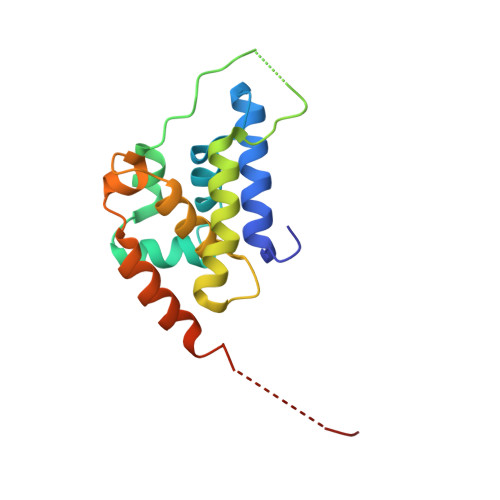Clp-targeting BacPROTACs impair mycobacterial proteostasis and survival.
Hoi, D.M., Junker, S., Junk, L., Schwechel, K., Fischel, K., Podlesainski, D., Hawkins, P.M.E., van Geelen, L., Kaschani, F., Leodolter, J., Morreale, F.E., Kleine, S., Guha, S., Rumpel, K., Schmiedel, V.M., Weinstabl, H., Meinhart, A., Payne, R.J., Kaiser, M., Hartl, M., Boehmelt, G., Kazmaier, U., Kalscheuer, R., Clausen, T.(2023) Cell 186: 2176
- PubMed: 37137307
- DOI: https://doi.org/10.1016/j.cell.2023.04.009
- Primary Citation of Related Structures:
8B9O, 8B9U - PubMed Abstract:
The ClpC1:ClpP1P2 protease is a core component of the proteostasis system in mycobacteria. To improve the efficacy of antitubercular agents targeting the Clp protease, we characterized the mechanism of the antibiotics cyclomarin A and ecumicin. Quantitative proteomics revealed that the antibiotics cause massive proteome imbalances, including upregulation of two unannotated yet conserved stress response factors, ClpC2 and ClpC3. These proteins likely protect the Clp protease from excessive amounts of misfolded proteins or from cyclomarin A, which we show to mimic damaged proteins. To overcome the Clp security system, we developed a BacPROTAC that induces degradation of ClpC1 together with its ClpC2 caretaker. The dual Clp degrader, built from linked cyclomarin A heads, was highly efficient in killing pathogenic Mycobacterium tuberculosis, with >100-fold increased potency over the parent antibiotic. Together, our data reveal Clp scavenger proteins as important proteostasis safeguards and highlight the potential of BacPROTACs as future antibiotics.
Organizational Affiliation:
Research Institute of Molecular Pathology, Vienna BioCenter, 1030 Vienna, Austria; Max Perutz Labs, Vienna BioCenter, 1030 Vienna, Austria; Vienna BioCenter PhD Program, Doctoral School of the University of Vienna and Medical University of Vienna, 1030 Vienna, Austria; University of Vienna, Center for Molecular Biology, Department for Biochemistry and Cell Biology, 1030 Vienna, Austria.















